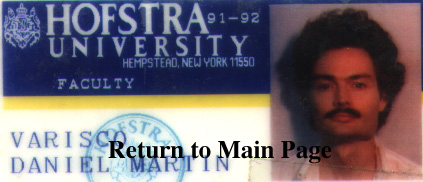- Anthro 145
- Prof. Varisco
- Fall 2002
-
- STUDY GUIDE FOR A145
CONCEPTS
-
- MIDTERM EXAM CONCEPT STUDY GUIDE (to be
held on 10/15/02)
- FINAL EXAM CONCEPT STUDY GUIDE (to be
held on 12/19/02)
- Suggestions for Studying
- Sample Concept Study Notes
- EXTRA CREDIT
MIDTERM EXAM CONCEPT STUDY
GUIDE
- (for midterm on 10/15/02)
-
-
- The short-answer questions on Exam #1 will be based on key
concepts, ideas, and approaches covered in class through 10/8/02.
I indicate the main reading for the concept, but you are also
responsible for what is said in class lectures. It is important to
know not only the "definition," but also be able to provide an
example from the course or apply the idea to something new. I will
choose questions from the following key issues for this exam.
-
- • What fossil evidence suggests early humans were not
monogamous? (Small, ch.1)
- • Why do human females have fatty breasts? (Small,
ch.1)
- • What is the relevance of hunter-gatherer economics to
gender roles? (Ward, ch. 1)
- • What is the significance in the ethological research
of Shirley Strum on baboons? (Ward, ch. 4)
- • How does bonobo chimp social behavior differ from Pan
troglodytes, according to de Waal (1995)?
- • What are the differences in social organization
between bonobos, gibbons, gorillas and orangutans? (de Waal
1995)
- • What does Desmond Morris mean by "status sex"?
(Morris 1996)
- • Why are humans sexually aroused by visual stimuli?
(Small, ch. 2)
- • What does Friedl (1994) think are the consequences of
"hidden sex" in human societies?
- • What does Small (ch. 3) prefer as a model to explain
the evolution of female menstruation?
- • What would an evolutionary psychologist think is the
best explanation of early human male mating strategy? (Small,
ch.5)
- • Why do societies ever engage in female infanticide?
(Ward, ch. 3)
- • What are the basic differences in child-raising
practices between the Arapesh, Mundugumor and Tchambuli, according
to Mead? (Ward, ch. 2, Mead 1955)
- • What does Mead say is the Samoan role toward female
virginity? (Mead 1968)
- • What does Freeman (1984) say are the main problems
with Mead's ethnographic methods?
- • What does Leacock (1992) say both Mead and Freeman
ignore in their analysis of Samoa?
-
-
-
FINAL EXAM CONCEPT STUDY
GUIDE
- (to be held on 12/19/02)
-
- Forthcoming
-
-
Sample Concept Study Notes
-
- In order to provide an example of what I would consider
"comprehensive" study notes for a concept, consider the notes you
could take for the concept:
-
- SAMPLE CONCEPT: What are the cross-cultural findings
about sex outside marriage? (Small, ch. 5)
-
- esp.pp.133-134
-
- Casual Sex: Regional differences
- • Pacific Islands most permissive
- • African and Eurasian reasonably tolerant
- • Most restrictive around Mediterranean
- my question: could this be due to the monotheisms?
-
- Adultery:
- • over 3/4 of cultures have some adultery admitted by
both men and women
- • usually men more than women
- • but probably even higher since many people on sex
surveys don't answer this
- • some studies suggest as high as 10% of births not from
husband noted on certificate
- • woman risks scorn and punishment
- my question: Is female adultery more common in
polygynous societies?
-
-
-
Suggestions for Studying:
-
- • Keep notes on the issues listed above as you read about
them or hear about them in class lectures. One way to do this is
to write each issue at the top of a file card or sheet of paper
and jot down notes as you read and study that will serve as a
study guide for the concept exam.
- • I will be glad to look over your notes to make
suggestions (except at the last minute before the exam!). The best
way to do this is to make an appointment and come to my office,
where we can go over them together.
- • If you do not understand the idea from the reading or
as it is discussed in the relevant class, you need to ask for
clarification in that class, email me or come and see me in my
office.
-
-
Extra Credit:
-
- Each student in the class has an opportunity to earn
extra-credit points while at the same point properly preparing for
the first two exams. Students who hand in their study notes (these
can be hand-written) at the time of the exam can earn up to 3
extra credit points, according to the following criteria:
-
- 3 points (comprehensive and concise notes for each
concept)
- 2 points (adequate notes for each concept)
- 1 point (adequate notes for at least half of the
concepts)
-
- NOTE: If you choose not to prepare seriously for the exam,
you will probably not do well on it.
-
-

-
